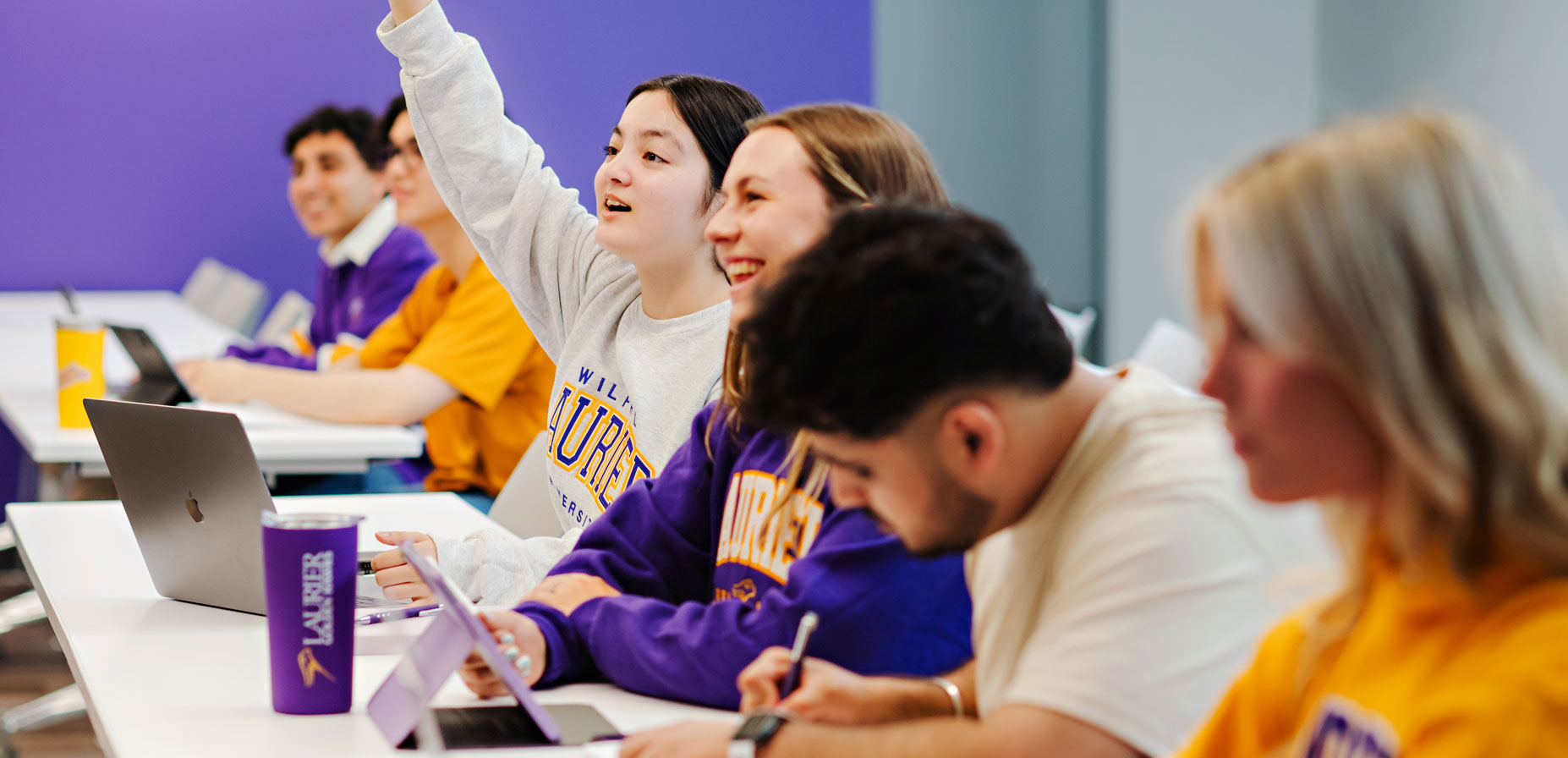Search for academic programs, residence, tours and events and more.
Laurier’s Bachelor of Music Therapy (BMT) is Ontario’s only undergraduate degree of its kind—a program designed to prepare you for certification with the Canadian Association of Music Therapists (CAMT). Throughout the program, you’ll learn to design and implement music-based interventions that support the emotional, cognitive, physical and social well-being of clients. With hands-on clinical placements and guidance from expert faculty, you’ll experience the true impact of music.
Entry to the program begins with Laurier’s Bachelor of Music. After completing two years of study, eligible students can apply to move into the BMT program for their final two years. If you already have an undergraduate degree, explore our Master of Music Therapy, a two-year graduate option designed for those entering the field of music therapy from a wide range of academic backgrounds.
Designed for real-world success, this program equips you with the skills, experience and confidence to make a meaningful impact in the field of music therapy:
Here are just a few of our students’ favourite ways to apply their learning in the real world throughout their degree:
Get a glimpse of what your will study throughout your degree. See what your first-year courses will look like through sample courses and start exploring what your upper academic years can offer.
Students who wish to pursue the Bachelor of Music Therapy must begin their studies in Laurier's Bachelor of Music.
Students are required to complete all mandatory Bachelor of Music courses, plus the following three courses as their electives:
Explore a variety of courses, specializations and pathway options thet let you shape your degree around your unique interests and goals. Find out how you can customize your experience and prepare for wht's next.
Some Bachelor of Music Therapy graduates choose to pursue Laurier's one-year Master of Music Therapy (MMT) to gain additional credentials and qualify for membership with the College of Registered Psychotherapists of Ontario (CRPO).
Laurier’s MMT is currently the only music therapy program in Canada recognized by the CRPO, enabling graduates to work in the regulated field of psychotherapy.
Graduates may also go on to further study in areas such as education, social work, occupational therapy or pursue research-based graduate programs.
If you already have an undergraduate degree, we encourage you to explore Laurier’s two-year Master of Music Therapy program. It’s designed for individuals from a range of academic backgrounds who want to enter the field of music therapy and gain the necessary academic and clinical training for certification.
If you're interested in Laurier’s Bachelor of Music Therapy (BMT), you’ll start by enrolling in the Honours Bachelor of Music (BMus). After completing two years of BMus coursework—including required music and psychology courses—eligible students may apply for admission into the BMT program for Years 3 and 4.
The purpose of the audition and interview is to assess your musical, academic, interpersonal and self-reflective skills and your readiness for the Music Therapy program and clinical work.
Music therapists work in a wide variety of settings, including:
Alumni for life means that you have access to Career and Employment Support offered at Laurier for your entire career.
Getting a university education is an investment in your future.
At Laurier, we take financial health seriously by providing a wide variety of funding opportunities for you throughout your degree, such as scholarships and bursaries, and by equipping you with the skills to manage your finances effectively in the years to come.
In addition to entrance scholarships, you’ll automatically be considered for a Faculty of Music audition scholarship—no separate application required. These awards are based on your audition and recognize students who demonstrate strong musical ability, academic achievement, extracurricular involvement and/or financial need. Audition scholarship results are communicated at the same time as your audition results.
Scholarship opportunities continue beyond first year, with additional awards available through an application process.

Join us on campus and experience university life firsthand.
You can complete your program primarily through in-person courses where you will attend classes in a physical classroom on scheduled days and times, which you will see and choose from when you register for courses.
Connect face-to-face with your professors, learn alongside your classmates and be part of the campus community from day one.
Want to know what it’s really like to be a Laurier Golden Hawk? Student Life at Laurier is your social media source to get unfiltered content, first-hand stories and tips on living and learning at Laurier.
Questions? Email choosemusic@wlu.ca, call 548.889.8888 or see all Music faculty and staff.
Think this program might be the perfect fit for you and your future?